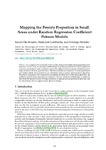Mapping the Poverty Proportion in Small Areas under Random Regression Coefficient Poisson Models

Use this link to cite
http://hdl.handle.net/2183/34236
Except where otherwise noted, this item's license is described as Attribution 4.0 International (CC BY 4.0)
Metadata
Show full item recordTitle
Mapping the Poverty Proportion in Small Areas under Random Regression Coefficient Poisson ModelsDate
2023Abstract
[Abstract] In a complex socio-economic context, policy makers need highly disaggregated poverty indicators. In this work, we develop a methodology in small area estimation to derive predictors of poverty proportions under a random regression coefficient Poisson model, introducing bootstrap estimators of mean squared errors. Maximum likelihood estimators of model parameters and random effects mode predictors are calculated using a Laplace approximation algorithm. Simulation experiments are conducted to investigate the behaviour of the fitting algorithm, the predictors and the mean squared error estimator. The new statistical methodology is applied to data from the Spanish survey of living conditions to map poverty proportions by province and sex, developing a tool to support policy decision making
Keywords
Algoritmos de aproximación
Simulación
Pobreza
Simulación
Pobreza
Description
Cursos e Congresos, C-155
Editor version
Rights
Attribution 4.0 International (CC BY 4.0)






